Types of Infertility in Females and Males, Causes & Treatment
Doctors classify the following types of infertility. Infertility can be male or female; primary or secondary; sterility (absolute infertility) or relative infertility; permanent or temporary. Let`s overview each of them as well as their most effective treatment techniques.

Let’s start with the definition of infertility to distinguish it from temporary difficulties of conception and other conditions.
Infertility is an inability to conceive a child after 12 months of regular unprotected sex. However, you should know that the one-year term is very arbitrary. For instance, the older a woman is, the more time it might take for the pregnancy. Therefore, before coming up with the conclusion that you have infertility, you should consider your age, health, and consult a doctor.
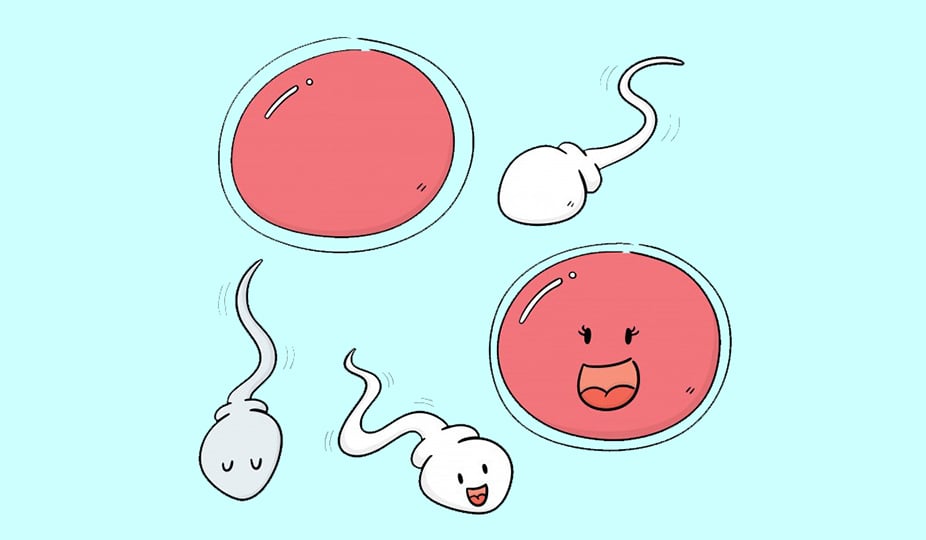
It is also worth mentioning that pathologies that cause conception problems can relate to both men and women. That is why doctors can make a clear diagnosis only after a complete examination of the couple.
Types of Female Infertility – Classification, Diagnostics & Treatment
Scientists distinguish different types of infertility in females depending on previous pregnancies, causes, timeline, and treatment possibilities.
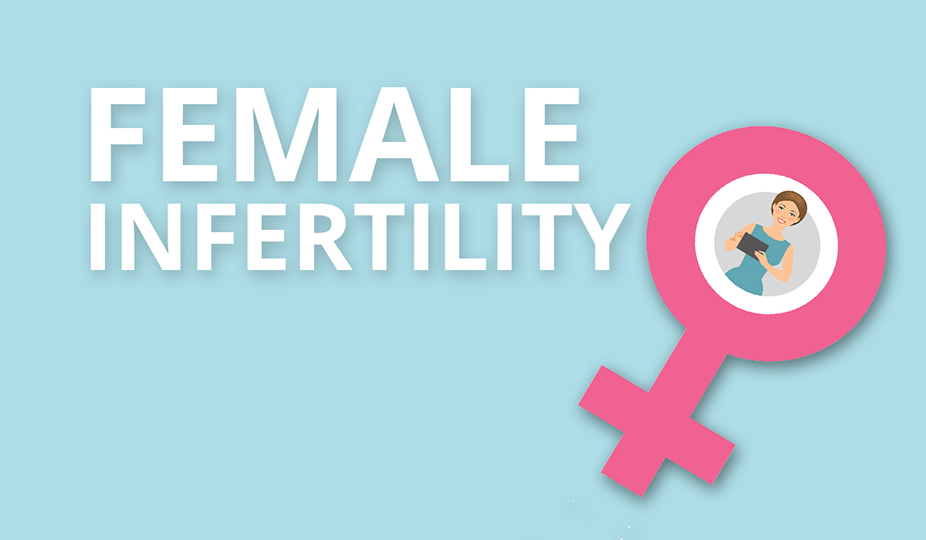
Primary vs. Secondary Infertility Types
Primary infertility type takes place if a woman cannot become pregnant and didn’t have previous pregnancies.
Reasons: endocrine diseases cause 60-80% of primary infertility cases.
Secondary infertility type occurs if women have biological kids from previous pregnancies. Alternatively, secondary infertility results from abortion, ectopic pregnancy, miscarriage, etc., and the woman cannot become pregnant again.
Reasons: inflammatory diseases of genital organs cause 80-90% of secondary infertility cases.
Absolute vs. Relative Female Infertility
Infertility is relative if a woman can have biological kids as a result of the medication or assisted reproductive technologies.
Reasons: PCOS, hostile uterus, etc.
Infertility is absolute if a woman cannot have biological kids even with the use of hormonal medication, IVF, and surrogacy.
Reasons: results from surgical removal of the ovaries, severe cases of endometriosis.
Luckily, with the development of modern reproductive technologies, more and more cases become relevant. E.g., ten years ago, the absence of fallopian tubes or uterus leads to absolute female infertility. Now it’s relevant because women can have healthy biological kids thanks to In-Vitro Fertilization (IVF) and Surrogacy.
Congenital vs. Acquires Infertility in Females

Congenital infertility is caused by hereditary and congenital pathologies. Genetic conditions that can lead to infertility are endocrine diseases, genital malformations, etc. It is also believed that factors such as smoking, medications, radiation, etc. can trigger genetic mutations. More than that, considering the age factor, we strongly recommend all couples over 35 consult genetics during pregnancy planning.
Acquired infertility type arises from diseases and other factors that influence female organism during the whole life. Most often, it coincides with secondary infertility.
Temporary vs. Permanent Infertility Types
Temporary infertility develops due to the passing causes. Anovulatory menstrual cycles during lactation or in early puberty are good examples of temporary female infertility.
Permanent infertility arises due to constant causes, such as absent fallopian tubes or uterus. Its alternative name is sterility.
Physiological vs. Pathological vs. Voluntarily Female Infertility
Women experience physiological infertility in the pre-pubertal and postmenopausal periods, during lactation, etc. In general, this type deals with regular cycles and states of the female organism. Pubertal and lactation changes are temporary and don`t lower the chances of having kids.
All etiological factors of primary and secondary infertility lead to pathological infertility. It means that something went wrong as a result of a disease or a condition.
Nowadays, women are also facing the third type of infertility, that has nothing to do with physiology or ovulatory disorders. That is a voluntary infertility. Due to socio-economic or other factors, a woman consciously does not want to become pregnant and give birth to children.
Infertility Types According to Cause Localization
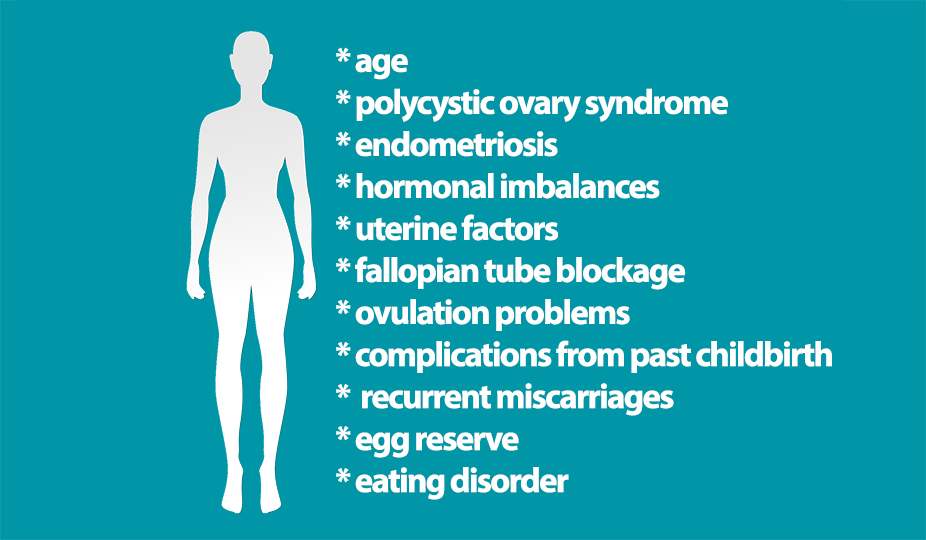
1. Tubal
A tubal infertility develops due to biological or functional pathology. Biological causes of tubal infertility are:
- inflammatory diseases;
- postpartum;
- postabortion;
- postoperative complications;
- fallopian tubes endometriosis.
Functional tubal infertility reasons are:
- pathology of the neuroendocrine system for regulating reproductive function;
- steroidogenesis;
- prostaglandin involvement.
2. Peritoneal
A peritoneal infertility has the same causes as tubal infertility. It is the result of adhesions caused by inflammatory diseases, surgical interventions on the genitals, and in the abdominal cavity.
Endometriosis is a peritoneal disease. As a result of endometriosis, the endometrium localizes outside the uterine cavity. It happens in 5-10 women out of 100. The causes of endometriosis can be mechanical, immunological, and hormonal. To diagnose it, the doctor needs the results of the gynecological and ultrasound examinations of the patient. The pathogenesis of this disease is still not entirely clear, therefore, unfortunately, there is no single approach to the treatment.
3. Endocrine
An endocrine infertility covers all forms of primary and secondary amenorrhea, follicular and luteal insufficiency, ovarian and adrenal hyperandrogenemia, hyperprolactinemia, etc.
Endocrine infertility occurs in women as a result of dysfunction of the ovaries, adrenal glands, pituitary gland, or thyroid gland. The female organism does not produce enough hormones, which leads to a malfunction in the maturation of the eggs. This type of infertility is most often temporary and disappears after hormonal normalization.
4. Immunological
Immunological infertility is a problem for 1 out of 5 couples. The reason lies in an autoimmune response of a female organism to sperm. The female body can produce a massive amount of antibodies and therefore kill the sperm before it can fertilize the egg. The most effective treatments are IUI insemination and IVF technology.
One more type is infertility due to malformations and disorders in the reproductive system, e.g.:
- hymen, vagina or cervical canal atresia;
- acquired cervical canal fusion;
- vaginal aplasia;
- double reproductive organs (uterus and vagina);
- traumatic damage to the genitals;
- retroflexed uterus and uterine.
5. Psychogenic
Psychogenic infertility results from psycho-emotional disorders and stress. It arises as a result of stress and other factors. Statistics say that at least 30% of couples cannot conceive a child as a result of psychological infertility. The fear of responsibility for the child or losing attractiveness is top-2 reasons for psychological infertility.
6. Uterine
Uterine infertility form appears due to multiple degenerative changes in the endometrium, inflammatory processes, and traumatic injuries.
Every third patient with primary infertility has uterine fibroids that become the main infertility reason. The diagnosis of this disease is not complicated. To detect a large and medium fibroid, a doctor needs a gynecological examination and ultrasound results. In some cases, they need to make hysteroscopy to determine the state of the endometrium. As a rule, uterine fibroids infertility is temporary, and a woman can become pregnant after the node removal.
7. Extragenital
Extragenital infertility form results from somatic diseases and can directly affect the generative function or lead to hormonal disorders.
Treatment of Different Female Infertility Types
Infertility treatment starts after establishing its form and causes. Moreover, doctors need to get information about the male partner health.

Endocrine Infertility Treatment
- Elimination of metabolic disorders (obesity), therapy of extragenital diseases, correction of possible thyroid, and adrenal gland disorders. These actions can contribute to the normalization of menstrual function and lead to pregnancy.
- Hormonal therapy or surgical treatment takes place. After the course of treatment, doctors should make a thorough examination of the patient.
Tubal and Peritoneal Infertility Treatment
Treatment of these two infertility types is conservative.
If doctors establish the idiopathic form of infertility, they can prescribe the following medications:
- antispasmodics;
- sedatives;
- tranquilizers;
- prostaglandin inhibitors;
- cyclic hormone therapy with estrogens and progestogens;
- psychotherapy;
- physiotherapeutic procedures;
- ultrasound;
- hydrotherapy.
In other cases, the patient might need surgical operation:
- salpingolysis;
- fimbriolysis and fimbrioplasty;
- salpingoplasty or salpingostomy;
- tube anastomosis ;
- tube implantation.
Immunological Infertility Treatment
Treatment of immunological infertility implies GCS (cyclic hormonal therapy) with estrogens, antihistamines, anabolic hormones. Doctors recommend patients to use condoms for 5-7 months to eliminate the intake of antigens in the woman’s body and reduce sensitization. Intrauterine insemination and IVF show the best results for immunological infertility treatment.
IUI Treatment
Artificial insemination (IUI) is the introduction of sperm into the genital tract of a woman induce pregnancy. Women can use the sperm of a male partner or a donor. It is sufficient to make insemination 2-3 times during the menstrual cycle on its 12-14th day.
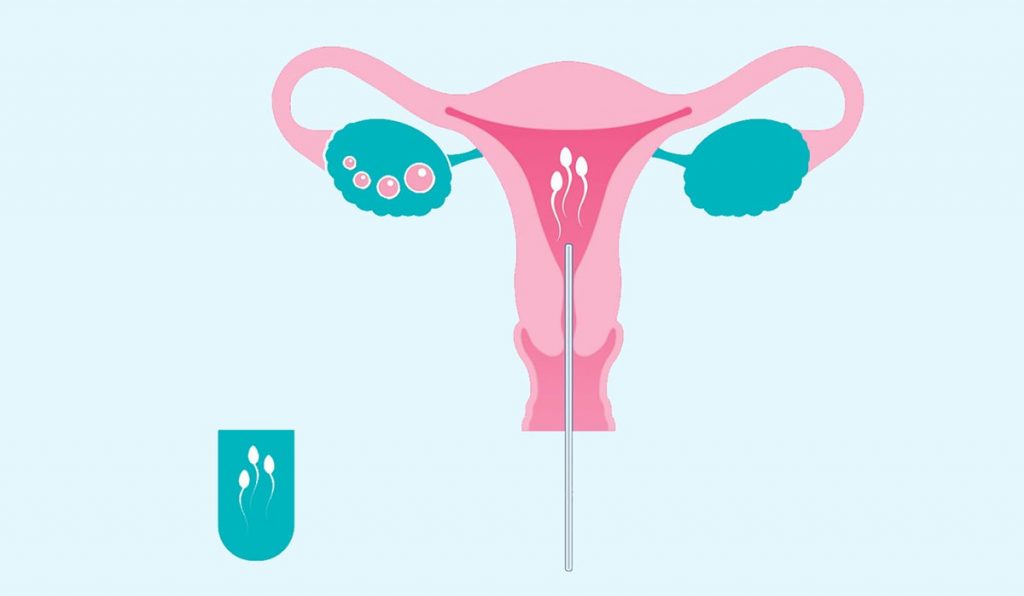
Donor sperm is obtained from men under 36 years of age, physically and mentally healthy, without inherited diseases and disorders. The pregnancy rate after artificial insemination is 10-20%. The course of pregnancy and childbirth are similar to those during natural conception.
IVF Treatment
In vitro fertilization (IVF) is external fertilization of eggs, cultivation, and transfer of the resulting embryos to the uterus.
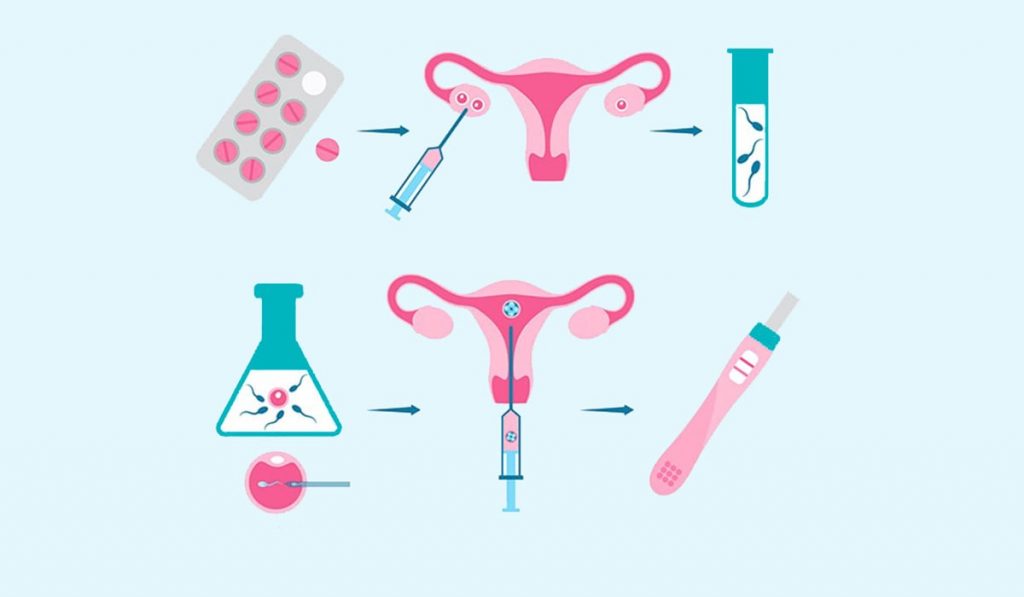
Assisted reproductive technologies allow the use of cryopreservation programs not only for sperm but also for oocytes and embryos, which reduces the cost of IVF attempts.
The standard IVF procedure consists of several stages:
- ovarian stimulation;
- egg retrieval under ultrasound control;
- oocyte insemination;
- embryo cultivation (48 hours);
- embryo transfer of 2-3 embryos to the uterine cavity;
Patients can use their own eggs or choose a healthy egg donor from the database.
Intracytoplasmic sperm injection (ICSI) is another modern type of IVF, which implies the transfer of a single sperm cell into the oocyte. It is quite useful if a male partner has sperm with poor or abnormal morphology.
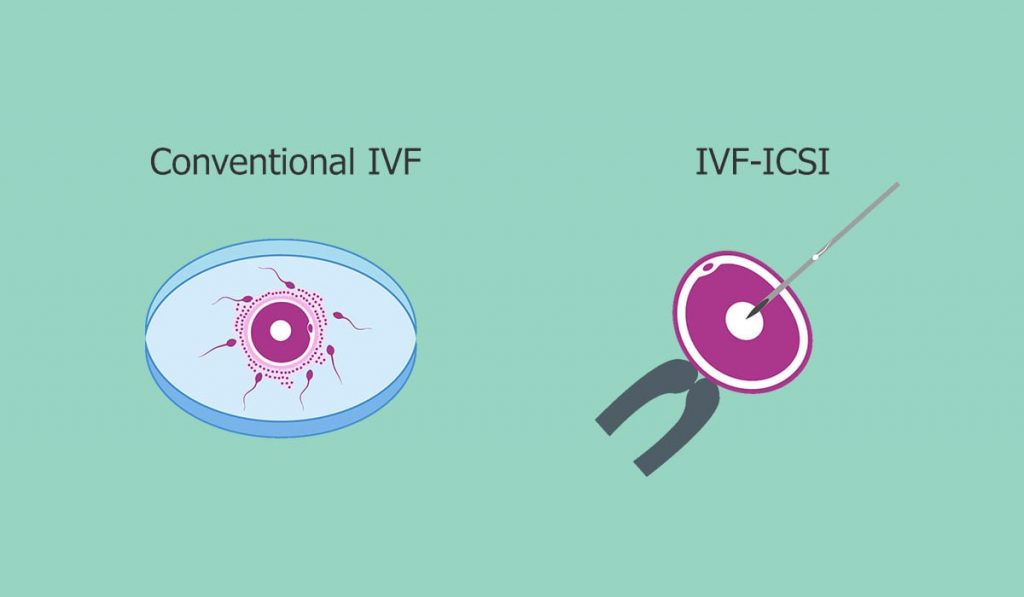
If you would like to know what treatment is the most suitable for you, or get a price estimate for the procedure, medication, and clinic expenses, feel free to give us a call or send a message. The consultancy is completely free of charge.
Types of Male Infertility
Male infertility is the inability of a mature male body to fertilize. It happens due to two major reason groups, i.e., secretory and excretory.
- Secretory infertility happens due to impaired spermatogenesis.
- Excretory infertility arises from sperm excretion problems.
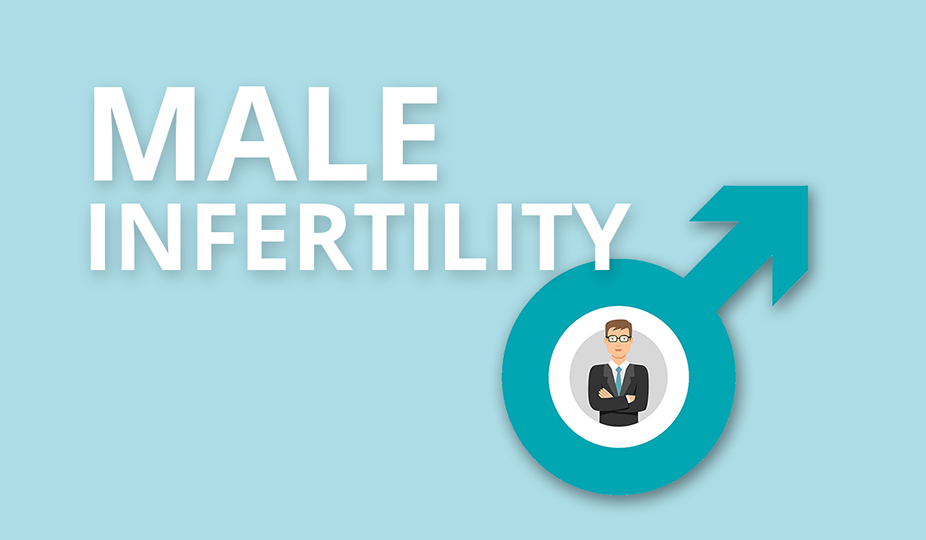
Etiological Factors that Cause Male Infertility
1. Impaired regulation of testicular function. That relates to impaired secretion of FSH and LHb or hyperprolactinemia.
2. Primary disorders in the testicles can be as follows:
- idiopathic;
- varicocele;
- chromosomal pathology (Kleinfelter’s syndrome);
- cryptorchidism;
- the effect of chemical agents and drugs;
- orchitis (traumatological and inflammatory);
- immunological.
3. Congenital or inflammatory obstruction of the vas deferens.
4. Disorders of additional gonads, namely:
- prostatitis;
- vesiculitis;
- congenital absence of spermatic cord or seminal vesicles.
5. Sexual intercourse disorders:
- rare sexual intercourse;
- hypospadias;
- impotence;
- hypospadias;
- retrograde ejaculation.
6. Psychological factors.
Male Infertility Examination
To define the male infertility type the patient has, doctors should make a thorough medical examination.

First of all, the doctor will ask the male patient about the complaints, family history, and heredity. Past illnesses, chronic diseases, previous surgery also play a significant role in diagnostics. In addition to the medical history examinations, doctors will ask about the sexual life, methods of contraception the man uses.
The second step is laboratory testing. They imply the study of spermatozoa. They test the sperm motility, assessment, and concentration of sperm, seminal fluid, and flora. Based on the spermiogram, normozoospermia, oligozoospermia, teratozoospermia, asthenozoospermia, azoospermia, aspermia are distinguished.
Additionally, doctors can make infection screening. This is a cytological analysis of the urethra, prostate secretion and seminal vesicles, bacteriological analysis of sperm and / or prostate secretion. It helps to diagnose chlamydia, ureaplasma, virus, etc.
They can also run a biochemical study of semen and hormonal examination, thermography, ultrasound, testicle biopsy, X-ray if the reason is of infertility is not clear.
Treatment of Male Infertility Types

Therapeutic options are limited. More often, doctors prescribe hormone replacement therapy. A patient can take clomiphene, tamoxifen, testosterone, gonadotropins. If the patient has obstruction of the vas deferens, doctors imply surgery.
Where Can I Diagnose and Treat Infertility?
We genuinely believe that almost every couple can conceive and give birth to a healthy baby. To make that possible, we offer accurate diagnostics and treatment of all infertility types and provide IVF, ICSI, and IUI services. Significant experience of our specialists, a modern scientific and technical base, an attentive approach to each client, and the use of the latest reproductive techniques are the key to the high efficiency of the clinic.

Let the numbers speak for us. Sunshine fertility experts have been helping people for more than 10 years. Consequently, thanks to the efforts of our doctors, more than 7,500 children were born.
[contact-form-7 id=”223″ title=”Contact form main”]
When a couple wants to have children but cannot get pregnant, it can make them desperate and hopeless. However, our doctors insist that the diagnosis of infertility does not mean that you should stop trying. Struggle, identify your infertility type and the causes of pathology and start to fight them.
